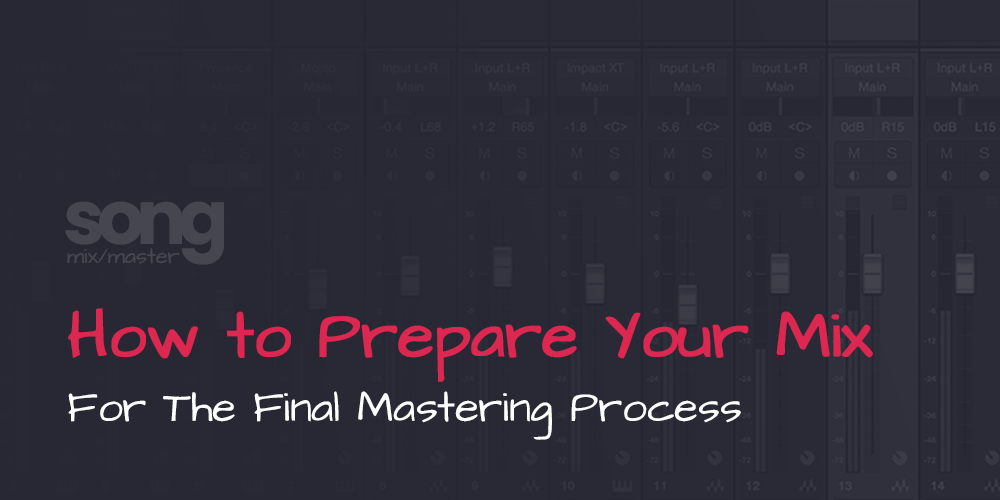Mastering
10 Tips On How to Prepare Your Mix for Final Song Mastering
In the world of music production, the mix and mastering stages are like two sides of the same coin. While mixing is all about shaping the individual tracks and crafting the perfect sonic landscape, mastering is the final track polish that brings out the full potential of your music.
As a professional sound engineer, I’ve seen countless artists struggle with mastering because they didn’t prepare their mix properly. In this article, I’ll share my insights on how to prepare your mix for the final mastering to ensure the best possible end result.
Start with a Quality Mix
Before you even think about mastering, your mix should be in top-notch shape. This means meticulously balancing and equalizing each element in your mix, eliminating any unwanted noise or distortion, and ensuring the overall tonal balance is pleasing. Remember, mastering is not a magic fix for a poorly mixed track.
Use High-Quality Files
When sending your mix for mastering, always use high-quality, uncompressed audio files in WAV or AIFF formats. These formats retain the maximum amount of detail and provide the mastering engineer with the best canvas to work on. Avoid sending MP3s or low-quality files, as they may limit the mastering engineer’s ability to enhance your music.
Leave Adequate Headroom
One common mistake is sending mixes that are too loud and already pushed to the limit. To prepare your mix for mastering, leave some volume headroom by ensuring that the loudest peaks don’t hit the digital ceiling (0 dBFS). Aim for peaks around -3 to -6 dBFS to provide the mastering engineer room to work their magic without risking clipping or distortion.
Remove Any Processing on the Master Bus
Before sending your mix for mastering, make sure there are no effects or processing (e.g., compression, limiting, or EQ) applied to the master bus. The mastering engineer will handle these tasks during the mastering process. Keeping the master bus clean allows them to make informed decisions based on the mix’s raw material.
Export at the Same Sample Rate and Bit Depth
Ensure that your mix and the mastering engineer’s session are set to the same sample rate and bit depth. Typically, a sample rate of 44.1 kHz and a bit depth of 24 bits are standard for audio mastering. Consistency in these settings prevents any potential issues during the mastering process.
Provide Reference Tracks
Giving the mastering engineer a few reference tracks that exemplify the sound you’re aiming for can be immensely helpful. This helps establish a shared understanding of your vision and provides a reference point for tonal balance, dynamics, and overall sonic quality.
Communicate Your Goals
Effective communication with your mastering engineer is key. Share your artistic vision, preferences, and any specific concerns you have about your mix. A good mastering engineer will take your input into account to shape the final product in line with your vision.
Include Proper Track IDs and Metadata
Ensure that all your tracks are labeled correctly with track titles and numbering. Include any metadata like ISRC codes, album titles, and artist names. This attention to detail ensures your music is properly cataloged and credited.
Consider Your Album Sequence
If you’re mastering a collection of songs for an album, think about the order in which they will be presented. Discuss this with your mastering engineer, as they can provide valuable input on the ideal sequencing for flow and dynamics.
Trust the Professional
Once you’ve prepared your mix for mastering and handed it over to a skilled engineer, trust their expertise. Mastering engineers have the ears, equipment, and experience to bring out the best in your music. Be open to their suggestions and feedback, as their goal is to enhance your work, not change it beyond recognition.
Conclusion
Preparing your mix for mastering is a crucial step in ensuring your music reaches its full potential. By following these tips and collaborating closely with a skilled mastering engineer, you’ll be well on your way to achieving a polished and professional sound that showcases your artistry to its fullest.
Remember that the journey from mix to master is a partnership, and with the right preparation and trust in the process, your music can truly shine. Submit your track today for a free mastering demo.


Disclaimer: Any references to any brands on this website/webpage, including reference to products, trademarks, brands and companies, are provided for description purposes only. We don't have any association with or endorsement by these brands or companies. Some of the links on our blog may be affiliate links. This means if you click on these links and make a purchase, we may earn a commission at no extra cost to you.
Need Professional Mixing & Mastering?
You may also like to read...
My Advanced Techniques & Tips for Mixing and Mastering
A Producer’s Guide: 12 Tips To Creating Hit-Worthy Beats
Learn How Audio Saturation Can Improve Your Mixes
Exploring the New Features of iZotope Ozone 11
Vocal Serial Compression With 2 Compressors: The 1176 & LA-2A
Essential Home Studio Gear for Beginners on a $500 Budget